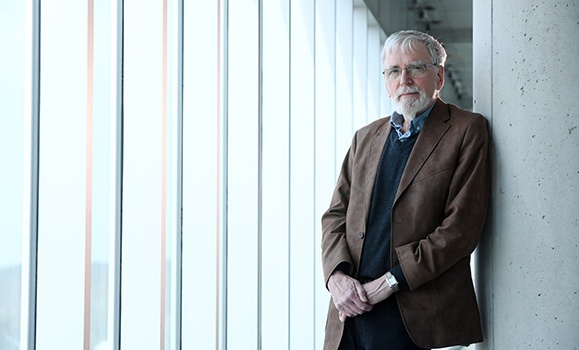Dr. Ford Doolittle has been elected to join the ranks of Stephen Hawking, Isaac Newton, Charles Darwin, Lise Meitner, and other leading scientists throughout history in the Royal Society.
Reputed as the world’s most esteemed organization devoted to the development and use of science for the benefit of humanity, the Royal Society is comprised of approximately 1,700 Fellows and Foreign Members — a number that includes 85 Nobel Laureates.
Each year, up to 52 Fellows and up to 10 Foreign Members are elected from a group of around 800 candidates proposed by the existing Fellowship. Dr. Doolittle is one of just 74 Fellows from Canadian institutions included in the Royal Society membership and one of just five Canadians added this year.
“I’m of course deeply honored to be named a Fellow of the Royal Society, to add FRS after my name, and to serve in this institution, which has as its motto, translated from Latin, ‘Take nobody’s word for it,’” says Dr. Doolittle. “I’d like to think that that is what I have been doing all along, as a scientist.”
Dr. Doolittle has a long career as an honoured academic. He attended Harvard, where he graduated with a Bachelor of Arts in 1963 and Stanford where he obtained his PhD in 1969, before taking a position in the Faculty of Medicine at Dalhousie where he is now Professor Emeritus.
Pushing the boundaries
For much of his storied 40-year career, Dr. Doolittle split his time between experimental work in evolutionary biology and what he calls “theoretical interventions.”
Dr. Doolittle was featured in the Dalhousie Originals video series during the university’s 200th anniversary celebrations in 2018.
He frequently challenged traditional ideas held by scientists about the workings of DNA and the human genome. In the 1970s, he worked to prove the then-controversial “endosymbiont hypothesis” for the origin of chloroplasts — an organelle within the cells of plants and certain algae that is the site of photosynthesis.
A decade later he proposed that most DNA is “selfish” or parasitic, its primary purpose being to make copies of itself. And then, at the turn of the millennium, Dr. Doolittle argued for gene-swapping as the driving force in early evolution, figuratively tearing down Charles Darwin’s “tree of life” as failing to account for two-thirds of life’s history on Earth.
"Dr. Doolittle is a luminary in our university’s academic history,” says Dr. Alice Aiken, Dalhousie’s vice president research and innovation. “He is supremely curious about the fundamental nature of life and has used science to help us better understand who we are and where we come from. Our community is immensely proud of his extraordinary contribution to the understanding of the origins of life.”
A celebrated career
Dr. Doolittle directed the Canadian Institute for Advanced Research’s Evolutionary Biology Program for 20 years, which made Canada uniquely strong in early cell and genome evolution.
For his achievements, Dr. Doolittle received the 2013 Gerhard Herzberg Gold Medal, Canada's top prize for sicence which is accompanied by an unrestricted million-dollar research grant, and the Killam Prize of the Canada Council, another of Canada’s most-coveted academic awards.


